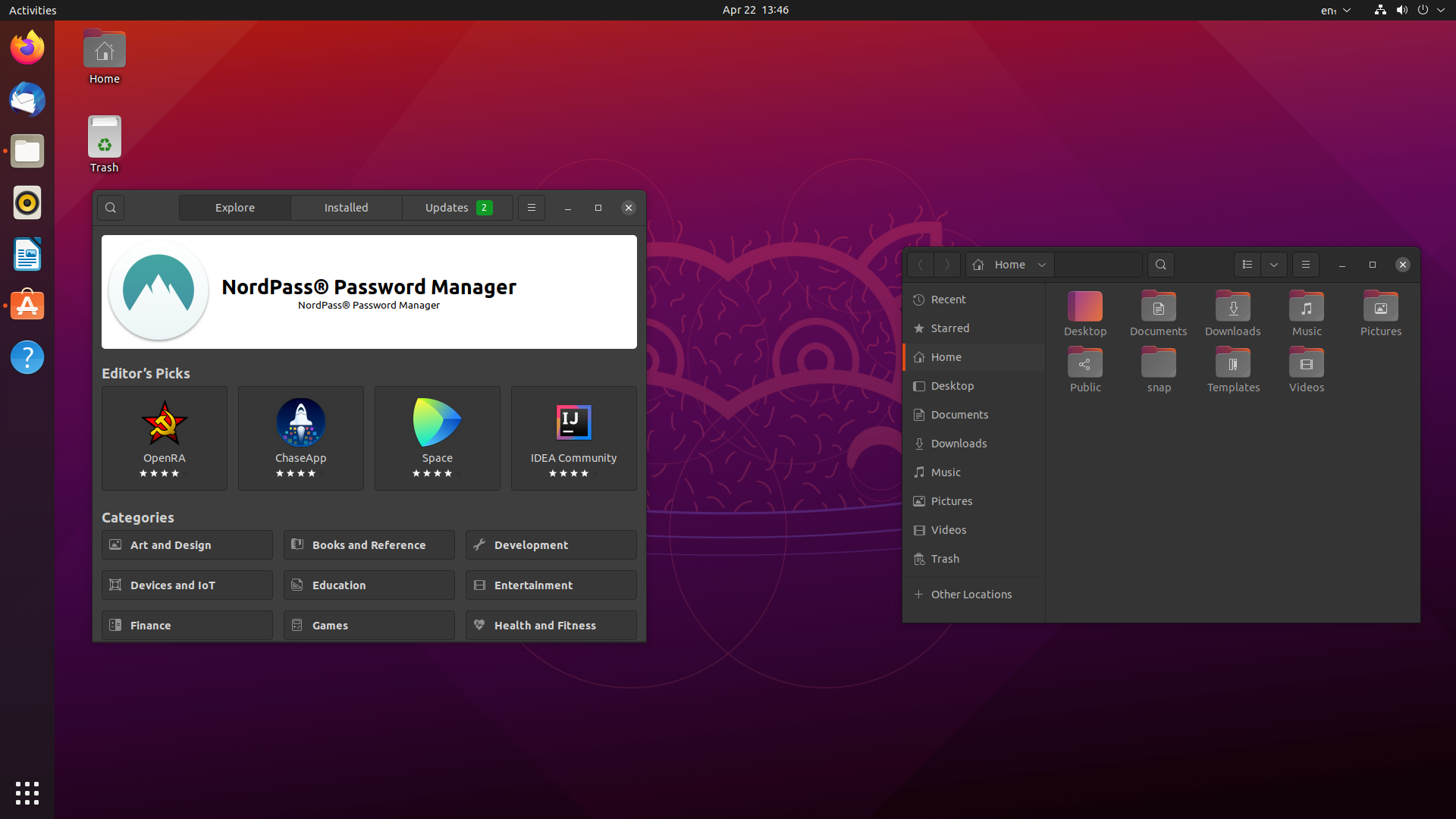Continuing the gradual improvements towards the next LTS (Long Term Support) release, Ubuntu 21.04 is officially out now to bring some of the latest enhancements to the popular Linux distribution.
Between each LTS release, Canonical puts out one of these production-ready interim releases every six months with all the latest work. The current LTS is Ubuntu 20.04 supported until April 2025 with the next being Ubuntu 22.04 due April 2022. With the Ubuntu 21.04 release today it will provide at least 9 months of updates.
On the desktop the biggest change is probably that it uses Wayland by default which Canonical say is a "significant leap forward in security". Quite a few application have been ported already, while others will be run through XWayland. Although for NVIDIA users, right now you're likely stuck with Xorg until NVIDIA put out their upcoming newer drivers with work merged ready.
Some of the highlights include:
- An enterprise partnership with Microsoft, to bring native Microsoft Active Directory integration with the support for Microsoft SQL server, deployed on-prem or through the Azure Marketplace
- An Active Directory, to help developers manage workstations through configure system settings, directly from an AD domain controller
- A smoother graphics experience and better fractional scaling with Wayland by default – Firefox, OBS Studio and others are built with Electron and Flutter to take advantage of Wayland automatically
- A community maintained dark theme, Yaru, with accessibility improvements in navigation and new file icons
Read more on the official announcement, download Ubuntu here and read the release notes.
In other recent Ubuntu news, Canonical recently announced that the Community Team has been somewhat revived to directly serve the community with these tasks going forwards:
- Increase the number of contributors and foster future community leadership
- Create a more personable, positive, and supportive community
- Create a more effective community, where people are empowered to make things happen
- Increase collaboration between Canonical employees and volunteers in the community
Their initial plans for the group include "scheduling community office hours (with occasional special guests from the community and other Canonical teams), supporting regular engagement days (e.g. Testing and Bug Days), collaborating on a community roadmap, and advocating for increased community engagement across Canonical".
Tomorrow, April 23, the Ubuntu Desktop Team will also be doing an AMA (ask me anything) with team members and the community at 3PM UTC. You can join in on the Ubuntu OnAir YouTube.
I guess they wouldn't have done the same for an LTS version...?
I didn't follow closely, but I'm surprised they've made the switch to default to Wayland.
I guess they wouldn't have done the same for an LTS version...?
They've already missed several LTS "deadlines" for Wayland as default. I suppose they really didn't want to miss 22.04, so they had to start now.
Still not really seeing myself going to Wayland though (even when nvidia support is included in the near future). I need flawless support for G-Sync and VR for that to happen.
An enterprise partnership with Microsoft, to bring native Microsoft Active Directory integration with the support for Microsoft SQL server, deployed on-prem or through the Azure MarketplaceNow I just need to convince my org's head of security that I should be able to use Ubuntu instead of Win 10...
An Active Directory, to help developers manage workstations through configure system settings, directly from an AD domain controller
I didn't follow closely, but I'm surprised they've made the switch to default to Wayland.It's not the first time; one of the previous interim releases tested it on a different LTS cycle, but it wasn't ready then. If there's been sufficient work done so that everything works, they'll keep it, otherwise they'll switch back to X again for the next release and try again another time.
I guess they wouldn't have done the same for an LTS version...?
Edit: just checked, and it was 17.10 when they tested it before, the release that discontinued Unity.
Last edited by CatKiller on 22 Apr 2021 at 3:03 pm UTC
Looking forward to updating my ThinkPad laptop to the release rather than the beta, although I've actually had very few problems with the beta. Hopefully, the enterprise partnership will bring more advances with WSL as a side effect.
Should be interesting to see how this goes.You are already on the release if you installed the beta. Its the same repositories, so just keep on doing normal updates as they come along.
Looking forward to updating my ThinkPad laptop to the release rather than the beta, although I've actually had very few problems with the beta. Hopefully, the enterprise partnership will bring more advances with WSL as a side effect.
I'm personally waiting for Anydesk to support it.
"An enterprise partnership with Microsoft.."Sadly, this is what gets it onto corporate desktops instead of something like Redhat Workstation.... better integration with AD is basically the thing that has held it back for a long long time. Got to be able to let CIT log in and do things to your laptop remotely, right???
Enough reason to not use it
This release for me is actually more about getting a new release of Pop_OS! As that's the variant I prefer. Though the issue I have with this release is they decided to go against their original plans to always have the latest Gnome (again) and are not installing 40. Oh well.
Though the issue I have with this release is they decided to go against their original plans to always have the latest Gnome (again) and are not installing 40. Oh well.I think it's probably because the new gnome release broke a lot of extensions, so it'll take some time to update that.
I think they'll implement GNOME 40 in 21.10 to test if it'll be ready for the 22.04
"An enterprise partnership with Microsoft.."Sadly, this is what gets it onto corporate desktops instead of something like Redhat Workstation.... better integration with AD is basically the thing that has held it back for a long long time. Got to be able to let CIT log in and do things to your laptop remotely, right???
Enough reason to not use it
The blog post is actually about two different things, notice this at the start
Today, Canonical released Ubuntu 21.04 with native Microsoft Active Directory integration, Wayland graphics by default, and a Flutter application development SDK. Separately, Canonical and Microsoft announced performance optimization and joint support for Microsoft SQL Server on Ubuntu.
And then they do not clearly distinguish in the following text which is about what. Typical marketing text.
I could be wrong but the joint support is for Microsoft SQL server for 20.04 LTS, while the AD integration from the installer is for 21.04
For the discussion about 21.04 its better to go from the release notes in my opinion. The release announcement the blog post refers to without linking to it is out now to: https://lists.ubuntu.com/archives/ubuntu-announce/2021-April/000268.html
"An enterprise partnership with Microsoft.."Sadly, this is what gets it onto corporate desktops instead of something like Redhat Workstation.... better integration with AD is basically the thing that has held it back for a long long time. Got to be able to let CIT log in and do things to your laptop remotely, right???
Enough reason to not use it
This release for me is actually more about getting a new release of Pop_OS! As that's the variant I prefer. Though the issue I have with this release is they decided to go against their original plans to always have the latest Gnome (again) and are not installing 40. Oh well.
Actually AD integration has been available for Fedora and RHEL for a while through Fleet Commander - https://fleet-commander.org/
Not to mention that AD integration can be achieved on any distribution with realmd and sssd. It all depends on what level of abstraction you'd like.
At work I deploy (the linux side of) our dual boot Windows 10/Ubuntu workstations that are AD domain-joined with realmd during installation (computer name has to be different for the "two" computer objects). Our Red Hat workstations simply use AD for kerberos authentication and are not joined to the domain.
Setting up Active Directory / LDAP logins has been supported in Redhat based distributions for a LONG time. I want to say since 4 or 5 is when I first saw it? It's been many years. Though I don't think they made any particular deal with MS to get that."An enterprise partnership with Microsoft.."Sadly, this is what gets it onto corporate desktops instead of something like Redhat Workstation.... better integration with AD is basically the thing that has held it back for a long long time. Got to be able to let CIT log in and do things to your laptop remotely, right???
Enough reason to not use it
This release for me is actually more about getting a new release of Pop_OS! As that's the variant I prefer. Though the issue I have with this release is they decided to go against their original plans to always have the latest Gnome (again) and are not installing 40. Oh well.
Actually AD integration has been available for Fedora and RHEL for a while through Fleet Commander - https://fleet-commander.org/
I think the new thing here really is better integration overall with AD (controlled via group policies). Funny thing about this, is it probably still uses newer Samba. Which can't be done on Apple computers, as they hate GPLv3.
Not to mention that AD integration can be achieved on any distribution with realmd and sssd. It all depends on what level of abstraction you'd like.
At work I deploy (the linux side of) our dual boot Windows 10/Ubuntu workstations that are AD domain-joined with realmd during installation (computer name has to be different for the "two" computer objects). Our Red Hat workstations simply use AD for kerberos authentication and are not joined to the domain.
We have strong hatred for sssd... though I know that's our own fault on how we use it vs the actual piece of software. But it does seem to be one of those that most organizations abuse and don't set it up correctly to scale.
Last edited by prosoor on 23 Apr 2021 at 7:34 pm UTC
SSSD has supported GPO control for a while. [https://access.redhat.com/documentation/en-us/red_hat_enterprise_linux/7/html/windows_integration_guide/sssd-gpo](https://access.redhat.com/documentation/en-us/red_hat_enterprise_linux/7/html/windows_integration_guide/sssd-gpo)
That being said, yeah, SSSD is *fun* to work with.
TBH, I don't know much about Wayland. But I am still happy to see Ubuntu switching to it because I like new things and it will likely speed up development.It's great... until you find random things that don't work. Like I thought for sure the Tomb Raider ports were broken on my Atari VCS with Debian installed. Just turned out it was because I was running Wayland. From a user perspective, you're probably not going to notice anything except that Alt+F2 and R won't restart Gnome...











 How to set, change and reset your SteamOS / Steam Deck desktop sudo password
How to set, change and reset your SteamOS / Steam Deck desktop sudo password How to set up Decky Loader on Steam Deck / SteamOS for easy plugins
How to set up Decky Loader on Steam Deck / SteamOS for easy plugins
See more from me